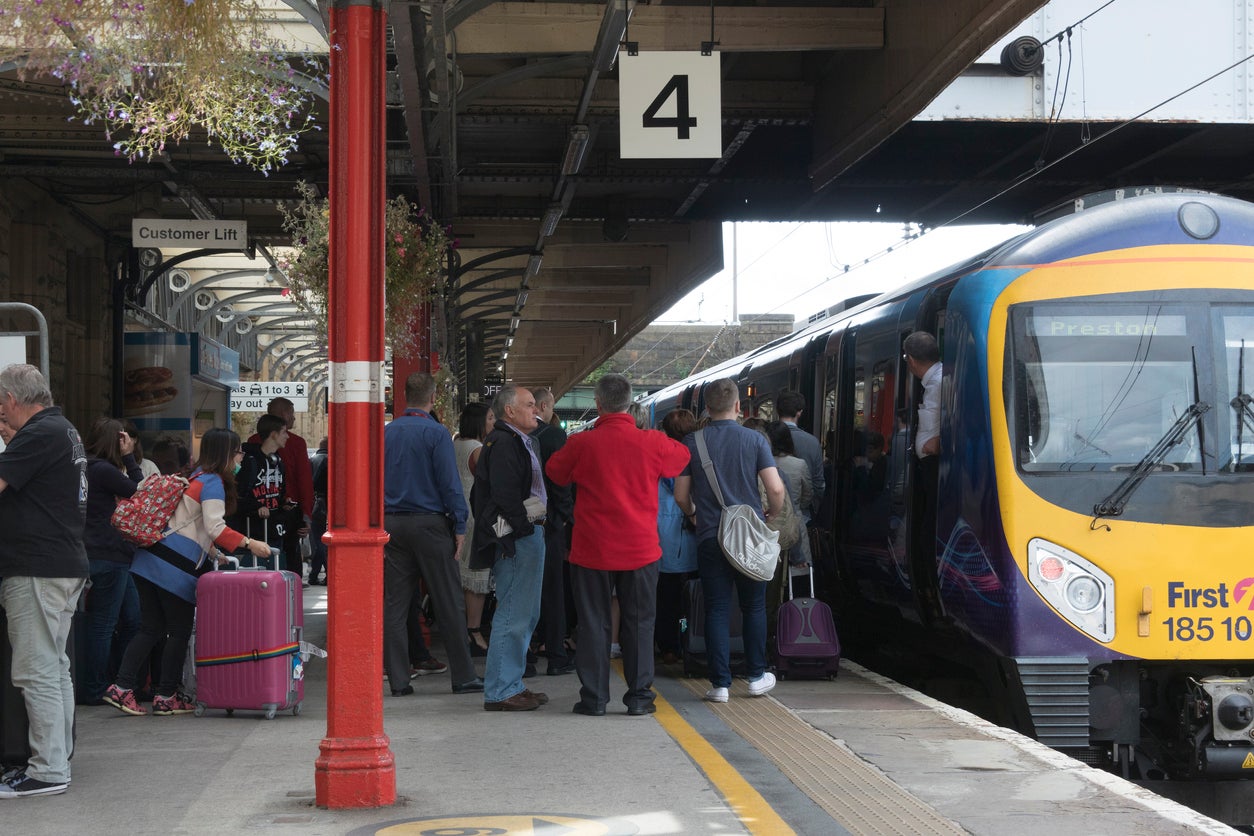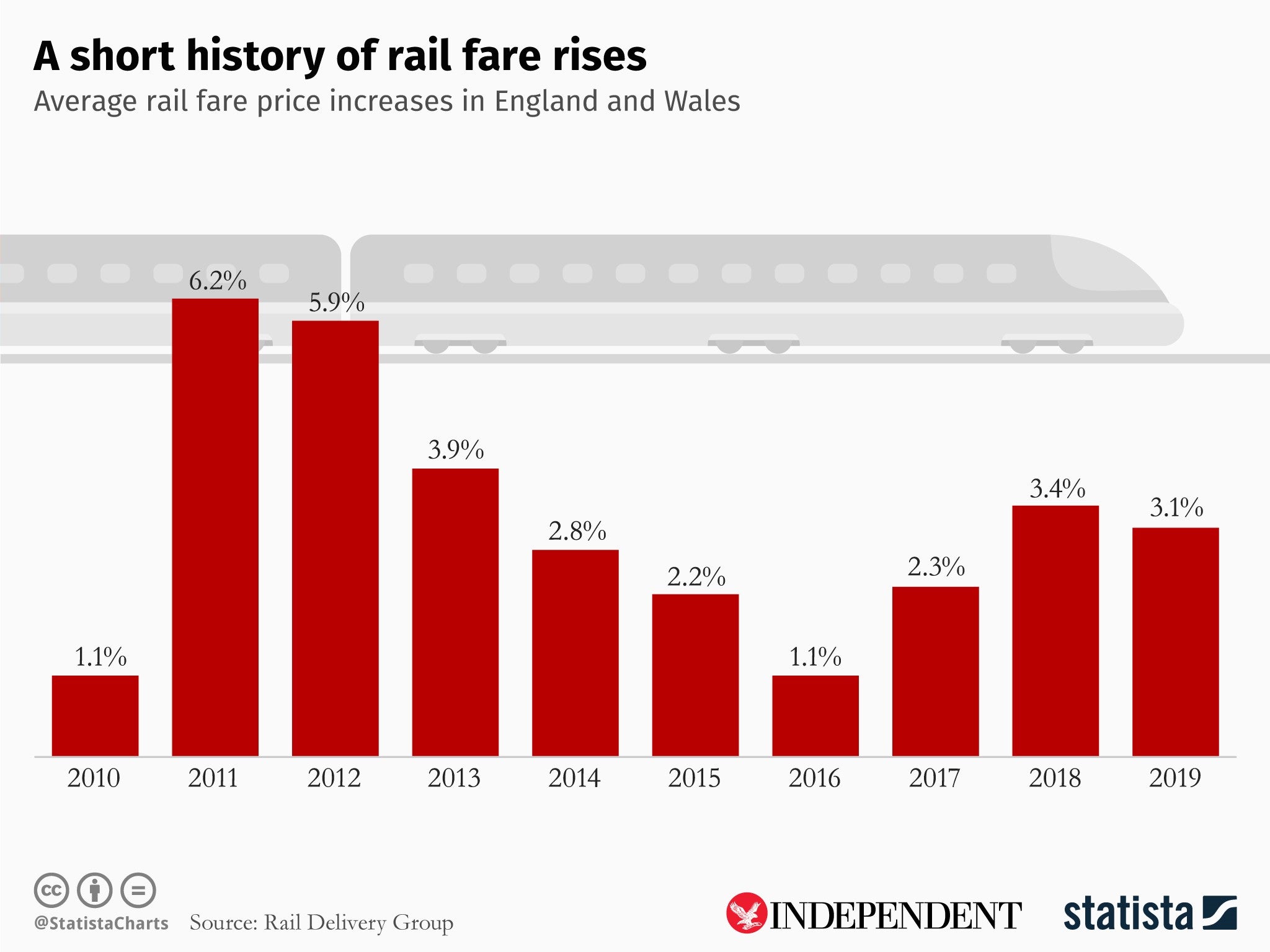The Independent's journalism is supported by our readers. When you purchase through links on our site, we may earn commission.
Rail fare increases: Everything you need to know
How the 3.1% rail fares increase will impact your wallet

Your support helps us to tell the story
From reproductive rights to climate change to Big Tech, The Independent is on the ground when the story is developing. Whether it's investigating the financials of Elon Musk's pro-Trump PAC or producing our latest documentary, 'The A Word', which shines a light on the American women fighting for reproductive rights, we know how important it is to parse out the facts from the messaging.
At such a critical moment in US history, we need reporters on the ground. Your donation allows us to keep sending journalists to speak to both sides of the story.
The Independent is trusted by Americans across the entire political spectrum. And unlike many other quality news outlets, we choose not to lock Americans out of our reporting and analysis with paywalls. We believe quality journalism should be available to everyone, paid for by those who can afford it.
Your support makes all the difference.Rail fares have increased by an average of 3.1 per cent in England and Wales, and 2.8 per cent in Scotland. The rise is calculated on July 2018’s retail price inflation (RPI), which stood at 3.2 per cent.
The fare hike has also pushed the cost of intercity travel for some commuters above £1 a mile.
But how will these price hikes actually impact passengers? Here is everything you need to know.
Why have fares gone up?
Chris Grayling, the Secretary of State for Transport, said in an interview with BBC Radio 4’s Today Programme on 2 January that fares have risen “because the unions demand higher pay rises”.
Mick Cash, general secretary of the National Union of Rail, Maritime and Transport Workers, issued a statement in response to Grayling’s remark in which he blamed the ”toxic combination of gross mismanagement and profiteering by the private companies exploiting Britain’s rip-off railways”.
The statement went on: ”Our passengers have been left paying the highest fares in Europe to travel on rammed out and unreliable services and that is a national disgrace. The only solution is to sweep this whole racket away and return our railways to public ownership.
“On Chris Grayling’s watch our fragmented railways have lurched from crisis to crisis. Sorry is not enough. He should go, and he should go now.”

When did the price increases take effect?
Fares went up on 2 January, the first working day of 2019, meaning that all tickets purchased from today will be subject to the price hike.
How will season ticket holders be affected?
The cost of an annual standard-class Liverpool to Manchester season ticket is now £3,252, up from £3,152 in 2018, an increase of £100, according to figures published by the consumer organisation Which?
A Tweedbank-Edinburgh season ticket has gone up £88 to £2,820, while those commuting into London from Brighton will see the cost of their annual ticket rise £148 to £4,696.
The price of a Woking to London season ticket has jumped by £100 to £3,348, while a Maidenhead to London season ticket has increased by £96 to £3,188.
What about passengers making one-off journeys?
An unrestricted one-way adult ticket from London to Manchester goes up to £175, an increase of £6.
An Anytime single between Glasgow and Edinburgh is now £14.90, an increase of 50p. The increase on the same off-peak journey is just 30p, taking it to £13.20, thanks to a pledge by the Scottish government to cap non-rush hour journeys at one per cent above RPI.
How will Londoners be affected?
Many London fares are frozen until 2020 but there are significant increases to pay-as-you-go and cash fares on London Underground, Transport for London Rail, daily and weekly capping and Travelcards.
Pay-as-you-go fares for some journeys on London Overground routes to and from Liverpool Street have gone up by 20p or 30p.
Most adult single pay-as-you-go fares on National Rail within Zones 1-9 have gone up by 10p or 20p.
Daily capping has increased on all TfL services by 20p to 60p. A day’s travel within zones 1 and 6 now costs £12.80, compared to £12.50 last year.
The price of monthly Travelcards has increased by an average of 3.1 per cent, in line with other rail increases. In practice this means that a monthly Travelcard covering zones 1 to 6 has gone up by £7.30 to £246.60.
How can I get cheap train tickets?
Advance tickets, which are generally released 12 weeks in advance, generally offer the best deal. There’s also the practice of “splitting”, which involves buying two separate tickets.
The Independent‘s Simon Calder has some tips here.
Join our commenting forum
Join thought-provoking conversations, follow other Independent readers and see their replies
Comments